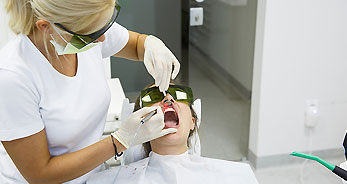
Non Surgical Gum Therapy
It does not matter how much care you take in maintaining your teeth and healthy smile, you could be suffering from gum disease. Gum disease affects many adults, and it can be a painful condition.
The Stages of Gum Disease
- Gingivitis: This is an inflammation of the gums caused by plaque buildup at the gum-line. If daily brushing and flossing does not fully remove the plaque, it produces toxins that irritate the gum tissue, causing gingivitis.If you are in the gingivitis stage you may experience bleeding during normal brushing and flossing. If we catch the condition at this stage it is very easy to reverse it as it has not caused any permanent damage yet.
- Periodontitis: This is the beginning of disease. At this stage, the supporting bone and fibers that hold your teeth in place are irreversibly damaged. Your gums will begin to form a pocket below the gum-line. This pocket traps food and plaque. An agressive treatment plan combined with proper home tooth care will prevent further damage. Periodontal disease damage some time is irreversible.
- Advanced Periodontitis: In the final stages of this periodontal disease the bone and fiber that hold your teeth together are severely damaged. Your teeth may be loose and you may have bad breath and bleeding.
Non-Surgical Gum Treatment Options
- Localized medication:
When the area of bacteria and plaque below the gum line has been determined, medication is applied directly into the affected areas as a first step toward preventing the gum disease.
- Curettage:
When your gums are infected, the tissues around your teeth can show signs of extremely irritation and inflammation. Infected gum tissue is removed so that new, healthy gum tissue can grow. In some cases we might need to do a gum graft to improve the healing of the gums.
- Root-Planning:
Sometimes, gum disease can affect the surface of your tooth’s root. Root-planning is taking off and smoothing small amounts of infected root surface. This allows your soft tissues to heal from the disease.
If the above treatments do not help improve your gum disease we may recommend surgery.


